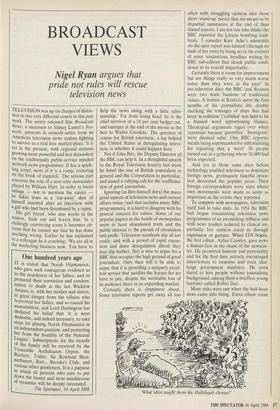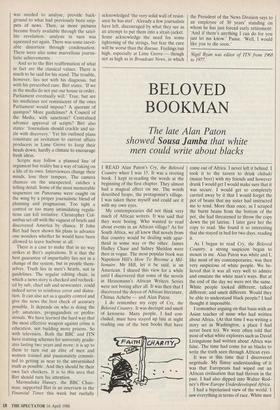BROADCAST VIEWS
Nigel Ryan argues that pride not rules will rescue television news TELEVISION was up on charges of distor- tion in two very different courts in this past week. The newly released film Broadcast News, a successor to Sidney Lumet's Net- work, presents in comedy-satire form an American television news station fighting to survive in a real free market-place. It is set in the present, with regional stations growing more powerful and less dependent on the traditionally public-service minded network news programmes. It has a spark- ling script; most of it is a romp, teetering on the brink of slapstick. The serious part concerns the role of a new-style newscaster played by William Hurt. In order to boost ratings — not to mention his career he fakes tears in a 'cut-away' shot of, himself inserted after an interview with a girl who had been threatened by a rapist.
His girl friend, who also works in the station, finds out and leaves him. In a chillingly convincing scene it becomes ob- vious that he cannot see that he has done anything wrong. Earlier he has explained to a colleague he is coaching: 'We are all in the marketing business now. You have to help the news along with a little sales- manship.' Far from being fired, he is the chief survivor of a 24 per cent budget cut, and emerges at the end of the movie as the heir to Walter Cronkite. The question of course for British television, a lap behind the United States in deregulating televi- sion, is whether it could happen here.
Not if John Birt, the Deputy Director of the BBC can help it. In a thoughtful speech to the Royal Television Society last week he listed the sins of British journalism in general and the Corporation in particular, and issued a rallying call for the reaffirma- tion of good journalism.
Ignoring (as Birt himself does) the many good aspects of television news and current affairs today (and that includes many BBC programmes), it is hard to disagree with his general concern for values. Some of our popular papers in the hands of monopolies seem to have abandoned truth and the public interest in the pursuit of circulation -and profit. Television standards slip all too easily; and with a period of rapid expan- sion and more deregulation ahead they may slip further. Birt is wise to argue for a BBC that occupies the high ground of good journalism. Only then will it be able to argue that it is providing a uniquely excel- lent service that justifies the licence fee we have to pay, despite the inevitable loss of its audience share in an expanding market.
Certainly there is sloppiness about. Some television reports get away all too often with smuggling opinion into those short 'stand-up' pieces that are meant to be impartial summaries at the end of their filmed reports. I am not one who thinks the BBC reported the Libyan bombing fault- lessly. I consider Kate Adie's admirable on-the-spot report was tainted (through no fault of her own) by being set in the context of some tendentious headline writing by BBC sub-editors that shook public confi- dence in its overall impartiality.
Certainly there is room for improvement but are things really so very much worse today than they were in the past? In pre-television days the BBC and Reuters were two main bastions of traditional values. A trainee at Reuters spent the first months of his journalistic life double checking the tonnages of ships that had been in collision' (`collided' was held to be a biassed word apportioning blame). Theological arguments raged over when `terrorists' became 'guerrillas'. 'Insurgents' were deemed safer. One BBC reporter recalls being reprimanded for editorialising for reporting that a 'mere' 50 people turned out at a gathering where 50,000 had been expected.
And yet in those same days before technology enabled television to dominate foreign news, grotesquely fanciful inven- tion decorated the popular press. Their foreign correspondents were stars whose own movements were made to seem as important as the events they reported.
To compete with newspapers, television itself had to take risks. In 1954 the BBC had begun transmitting television news programmes of an astonishing stiffness and with news readers reduced to clinical im- partiality lest opinion creep in through expression or gesture. When ITN began, the first editor, Aidan Crawley, gave news a human face in the shape of the newscas- ter. He permitted humour and personality and for the first time actively encouraged interviewers to examine and even chal- lenge government ministers. He even dared to hire people without journalistic background, among them a briefless young barrister called Robin Day.
More risks were run when the half-hour news came into being. Extra elbow room `What idiot taught them the Hallelujah chorus?'
was needed to analyse, provide back- ground to what had previously been snip- pets of news. Then; as more pictures became freely available through the satel- lite revolution, analysis in turn was squeezed yet again. There was some inevit- able distortion through condensation. There were also some marvellous journa- listic achievements.
And so to the Birt reaffirmation of what in fact are the classical values. There is much to be said for his stand. The trouble, however, lies not with his diagnosis, but with his prescribed cure. Birt states, 'If we in the media do not put our house in order, Parliament eventually will.' True, but are his medicines not reminiscent of the ones Parliament would impose? A quorum of quangos? More guidelines? A Council of the Media, with sanctions? Centralised advance approval of scripts? Birt also states: 'Journalism should crackle and siz- zle with discovery.' Yet his outlined plans constitute an invitation to current affairs producers in Lime Grove to keep their heads down; hardly a climate to encourage fresh ideas.
Scripts may follow a planned line of argument but reality has a way of taking on a life of its own. Interviewees change their minds, lose their tempers. The camera chances on the unexpected, catches a telling detail. Some of the most memorable sequences on Panorama were caught on the wing by a proper journalistic blend of planning and pragmatism. Too tight a control or too many intimidating regula- tions can kill initiative. Christopher Col- umbus set off with the vaguest of briefs and discovered America by chance. If John Birt had been shown his plans in advance one wonders whether he would have been allowed to leave harbour at all.
There is a case to make that in no way strikes at Birt's aspirations. It is that the best guarantee of impartiality lies not in a change of the system, but in people them- selves. Truth lies in men's hearts, not in guidelines. The regular editing chain, in which a news story is checked and recheck- ed by sub, chief sub and newscaster, could indeed serve to reinforce error and distor- tion. It can also act as a quality control and give the news the best check of accuracy possible. It depends on who is doing the job: amateurs, propagandists or profes- sionals. We have learned the hard way that the most effective weapon against crime is education, not building more prisons. So with television. Both the BBC and ITN have training schemes for university gradu- ates lasting two years and more: it is up to them to turn out an elite of men and women trained and passionately commit- ted to getting as near to the unvarnished truth as possible. And they should be their own fact checkers. It is to this area that Birt should turn his attention.
Marmaduke Hussey, the BBC Chair- man, supported Birt in an interview in the Financial Times this week but ruefully acknowledged 'the very solid wall of resist- ance he has met'. Already a few journalists have left, discouraged by what they see as an attempt to put them into a strait-jacket. Some acknowledge the need for some tightening of the strings, but fear the cure will be worse than the disease. Feelings run high, especially at Lime Grove — though not as high as in Broadcast News, in which
the President of the News Division says to an employee of 30 years' standing on whom he has just forced early retirement: 'And if there's anything I can do for you just let me know.' Pause. 'Well, I would like you to die soon.'
Nigel Ryan was editor of ITN from 1968 to 1977.































































 Previous page
Previous page